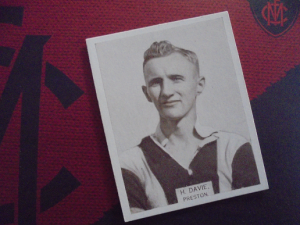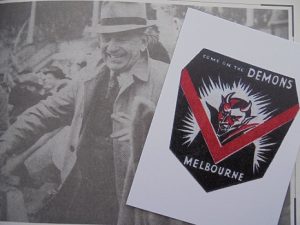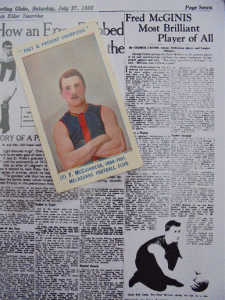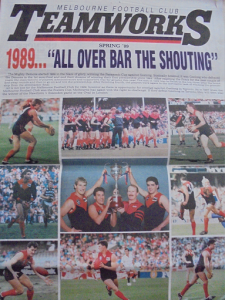Nigel Dawe
Nigel’s latest story on Harry Davie which continues our NSW Demons series promoting and shining a light on the greatest and oldest footy team in the world!
Nigel’s latest story on Harry Davie which continues our NSW Demons series promoting and shining a light on the greatest and oldest footy team in the world!

It’s funny, in every field of human endeavour (except for our form of footy and numerous other sports like soccer and hockey) a ‘goal’ is something that is set as a departure point of sorts, something to keep your eye on, work towards – never an endpoint in itself as such.
I’ve often thought, it’s a wonder the pioneers of our game didn’t coin something like claims, aims, targets or objectives – even ‘gets’ or ‘jects’ for short, as opposed to ‘goal’ which almost leaves you hanging in some way with the feeling that something still remains to be done. Maybe it’s just a simple case where the goal is the overall goal of the goal of a goal.
I think it’s now very clear that I’ve been spending way too much time in Covid-isolation, to be pondering the meaning and semantics behind the scoring of ‘sausage rolls’; but that said, what compares to the response in a packed MCG to a well threaded six-pointer at a crucial turn in a match!?
Cast your mind back to that beautiful moment in the finals of 2018 when Nate Jones dobbed that ripper against Geelong, in that one instant all his pent-up agony and frustration (along with ours too) just evaporated into the night sky like released volcanic steam above the ‘G. Or remember that absolute howler by Garry Lyon from almost the exact same spot against the Crows in the finals of ‘98, a full twenty years prior.
There’s something about the interest and aura that surrounds the game’s sharpshooters. Think even of their nicknames – ‘the Wizard’ for example, now you don’t get a tag like that from your mates and fans unless you’re not half bad at what you do! It’s the explosive brilliance of forwards, they are the ‘spearheads’ and absolute focal points that are there to convert a whole team’s endeavour into scoreboard gold.
One of the most unheralded forward line aces in the Melbourne Football Club’s history is the 1920’s Harry Davie, a small diminutive player who weighed a meagre 60kg and looked more like a slick little kitchen hand – which was quite apt, seeing he absolutely cleaned up in the goal-square. His perceived weakness (in terms of a distinct lack of size and weight) became his absolute weapon when it came to opponents who underestimated either his ticker or tenacity.
No player in the red and blue has scored more goals on debut than the #24 wearing Davie – slotting a casual six straight ones against Richmond in Rd 16 – 1924; which was no mean feat seeing his opponent that day was Vic Thorp (the league’s most respected and feared backman of that time). And so, if you’re going to announce yourself in your first outing in the Big League, then why not make an absolute example of the best going around.
Another feather in Davie’s cap (and this one is not just a club record but an all-time league record, held alongside none other than Gordon Coventry and Bob Pratt – two of the game’s absolute goal-square immortals). Each of these men put through 8 majors in one quarter of football! The day Davie notched his two less than 10 in the last quarter was against Carlton at Princes Park in Rd 14 – 1925, he ended that afternoon with an overall bag of 13.5 (with 3 out of bounds), the most goals scored by anyone at that ground in history.
Not until Fred Fanning went to work with 18.1 goals against St. Kilda in the final round of 1947 would any Melbourne player score more in the one match. To this day these two absolute thunderbolt bags by Fanning and Davie, constitute the top two efforts in front of the sticks by an individual in the entire history of the club.
Sadly for Davie, he would miss the 1926 premiership winning decider because of injury, but he did feature in a 3-way development that year which has only ever happened twice in Melbourne’s history, whereby he, Harry Moyes and Bob Johnson Snr all kicked over 50 goals in the same season.
Such a star-aligning achievement would not occur again for the red and blue until Garry Lyon, Allen Jakovich and David Schwartz all achieved the same 50-plus feat in the free-flowing, Neil Balme inspired season of 1994.
Whilst Harry Davie only played the 49 games for Melbourne and left the club at the end of 1927 to play with Carlton and then finally with the Roy Cazaly-led Preston Bullants in the VFA, his dynamic exploits in front of goal will no doubt linger long in the record books of the MFC.
** Whilst the footy card has Harry Davie featured in a Preston strip, I haven’t ever seen anything pertaining to him in the form of a Melbourne related card, but the up-closeness and quality of the snap seeing it’s near on 90 years old is a ripper and very exciting!

Nigel Dawe
It’s not an exaggeration to say, that Frank ‘Checker’ Hughes’ now infamous rant at his players (in which he implored them – to put it nicely – “to start playing like demons!”) during a match in his first year at the club in 1933, has always fascinated me.
Both in terms of how it was actually delivered, to whom and exactly when it occurred. Was it a pre-planned missive by the master coach or are we talking one of the great off-the-cuff moments in the history of the club?
One thing I’ve never been able to find out, was in which game it actually took place, and also there are a few different versions as to what transpired. Though I think this facet of the tale has much to do with there being a more mild-friendly, or shall we say a contemporary version of events, as opposed to an ‘actual version’ of how it all unfolded.
For a start, it’s hard to imagine our team known by any other moniker now, than ‘the Demons’, doubly so, seeing this tag has accompanied 10 of the club’s overall 12 premiership successes since the triple treat seasons of ‘39-40-41 (and excepting the massive disruption caused by WWII, many an old-timer has suggested that this golden sequence could well have stretched on for at least two to three seasons more, given the dominance and depth of talent at the club).
I personally think Checker’s demonic ‘christening’ of our team was an iron-willed masterstroke, not to mention a firmly set stamp of authority on a club he’d just taken the reins of; it was his Cortés moment (Cortés being the Spaniard who led an expedition to South America once, and famously announced when they all got there: “Burn the ships, we’re marching to Mexico City!”)
Keep in mind, Checker also famously sent 13 players packing and wore his old Richmond guernsey to his first training session at Melbourne (a psychological card-trick Barassi himself would play when he took over the Kangaroos decades later, by wearing his very own fire-forged red and blue #31, just to subtly announce: “What I’m asking you to do boys, I’ve already done!”).
On the topic of guernseys, Checker was also instrumental in altering Melbourne’s strip, getting rid of a thin red horizontal line at the base and making the upper red section more stark and pronounced (like the new coach himself, who apparently spoke commandingly out of the side of his mouth as would a mob boss or a gangster). It could even be argued that no figure has introduced more wholesale change, in terms of both the look and feel of a club in the entire history of the game.
The key to how the one-time Fuchsias became the modern-day Demons though (which wasn’t unusual for teams to have floral emblems of this kind – think of the Waratahs in Rugby even to this day – remembering our guernsey once had a red vertical stripe right down the middle of it, thus conjuring the spectre of this particular type of flower) resides very much with the late Checker Hughes, who passed away in 1978.
But the other smoking gun (aside from Captain Blood Dyer’s account of what ‘took place’, which I’ll return to soon) is the future celebrated newspaper scribe and best on ground in each of the three premiership wins – Percy Beames; out of all the celebrated stars of the Melbourne team at that time, like Jack Mueller, Norm Smith and Allan La Fontaine (who each commenced their careers in 1934) Beames was the only one on-deck at the club from 1931.
So conceivably, he was very much privy to and knew the story behind the original rant that resulted in the team becoming known as the Demons, doubly so, that he had the classic journo’s bent – of a refined eye and a great ear for the easily missed.
Unfortunately Percy Beames is no longer with us, having passed away in 2004. Which leaves the tale as told by Richmond’s Captain Blood, who revered and knew better than anyone, his first coach at League level – Checker Hughes. And so, according to Dyer, his wily old mentor let loose on his inherited batch of boys in ‘33, with perhaps the most red-hot roast of all-time: “You take pride in being called the Fuchsias – that’s the nearest thing I’ve heard to a pansy. You’re a laughing stock, now lift your heads and start playing like Demons!”
With that said, and this being the spot where the tale typically ends, I returned one last time to an array of record books and trawled through each game Melbourne played in season 1933, for the final ‘missing’ piece of the jigsaw; and Round 11 at the MCG v Hawthorn (July 8th) emerges as the most likely moment in time for Checker’s demonic spray.
Whereby, it’s no wonder the inferno-tinged nickname stuck, as there was a 50 point turnaround to proceedings post three-quarter time! This being the only game Melbourne trailed at three-quarter time that whole season to then reverse the deficit for a win – as every account of the story testifies. So, from being 12 points down at the last break, by the final siren, less than half an hour later ‘the Demons’ were thus surely born, not to mention winners to the tune of 38 points.
What’s more, something that afternoon clearly sent our boys absolutely berserk – Big Bob Johnson Sr in his last season (the oldest man on the ground) ended the day with a career best 12 goals, and a then 22 year-old Percy Beames hit the score sheet with four majors of his own; both players doing their bit to baptise and embolden our pitchfork-brandishing name, that will surely remain in the annals of Australian sport forever.
Nigel Dawe
The great American word-weaver, Walt Whitman once said: “So soon what is over forgotten, and waves wash the imprints off the sand.” It’s a line that could well be mounted as an apt warning, albeit reminder above both the front and back-doors of every footy club: to make your moments count, because even when you do, they still drift into the expansive kitbag of society’s ever-short memory.
As such, between me and a good mate of mine, George – who barracks for the Saints, we play a game (which has surged into over-drive during this Covid period of stagnation) where we ask for someone in our club’s history when we call each other, and the obscurer the better.
For example, I got him a good one the other day, I asked to speak with “Sam Gravenall, if he was available please?” Sam of course being the 1909 captain of the Saints, which had George stumped and had me thinking that was it, until he asked – “Only if I can speak with Ernie Vollugi?”, a bloke who played four games for Melbourne in 1904! Which I still think is unfair and in breach of our game’s unwritten rules, at least I stick with former captains, leading goal kickers and club best and fairest winners!
Over the years, well pretty much since I was a kid, I’ve been collecting all sorts of Melbourne related stuff, from autographs to old magazines and news clippings, guernseys and works of art. One gem I got hold of a few years ago was an old near mint condition cigarette card of Fred McGinis, who was perhaps our club’s first VFL draw-card and absolute match-winner, the vital cog and Vice Captain of the 1900 premiership winning side.
McGinis also won himself the inaugural VFL season’s ‘Champion of the Colony’ in 1897 (the precursor to the Brownlow medal) which was determined by the leading sport journos and scribes of the day, as opposed to the on-field umpires, which is the case in deciding the modern day gong. But McGinis, who isn’t mentioned all that often anymore, if at all, wasn’t just a Cool Hand Luke of a mid-field gun, he was considered the outright best player in the first 50 years of the game.
Whilst researching something long forgotten many moons ago, I chanced upon an article in the Sporting Globe from 1935 that backs up and fully re-enforces the above claim with regards to McGinis’ standing in the sport. Under the headline ‘Fred McGinis – Most Brilliant Player of All’, the journo and ex-player George Cathie reflected on the “sheer scintillating brilliance” of the little roving dynamo, placing him head and shoulders above even the stellar likes of your Albert Thurgood and Dave McNamara.
On the topic of the Champion of the Colony award, which lasted right up until 1945; our ‘Father of Football’ – H.C.A Harrison won a record five of them between 1862 and 1869. Legend even has it that the fleet-footed Harrison was so fast and good that in 1866 a ‘bouncing rule’ (which still exists to this day) was created so as to curb his match-winning ways!
Following on from that, how’s the cap-doffing words of unbridled praise made by a journo who went by the moniker of ‘Markwell’, in response to Harrison calling it quits to his playing career in 1872, referring to him as: “The mightiest warrior of his day whose flashing eye as much as his fine physique overwhelmed his adversaries.” Not a bad way to hang up your boots and quietly exit stage left, you’d have to say.

Nigel Dawe
When I think back, I was perhaps unlucky, and yet very lucky at the same time. Unlucky, that I lived a long way away from Melbourne; so I had to wait some years before I saw my Demons play in person, but lucky that I was a little older so as to take it all in and fully appreciate the experience, when it finally came.
Thus, my first brush with our boys in the red and blue came in 1989, at a mud soaked mid-season game at Moorabbin Oval, against the Saints.
I’ll never forget seeing our team run out that day, after all, they were my grand final heroes from the season before, not to mention the drought-breakers of ‘87 the year before that (so to say that this ‘stampeding’ sight has now been retained in full mental hyper-slow motion, would be a massive understatement). It still sends a shiver of absolute glee and pure dee-light down my spine all these years later, when I replay it in my mind.
That whole day was everything and more for a young kid from Broken Hill, and the poet Bruce Dawe (who tragically passed away only a few weeks ago) was quite on song when he en-saged in his poem, albeit absolute hymn to footy – ‘Life-cycle’:
“Hoisted shoulder-high at their first League game/ they are like innocent monsters who have been years swimming/ towards the daylight’s roaring empyrean/ Until now, hearts shrapnelled with rapture/ they break surface and are forever lost/ their minds rippling out like streamers…”
And so, I’d be lying if I said I recall every subtle turn of event from that late 80s outing, though we won the game by around 8 points. Brian ‘Brownlow’ Wilson topped scored and our captain Greg Healy also played a blinder. But one dominant recollection was the loose-lipped Saints fan, who kept jeering our red headed ruckman every time he went near the ball: “Hey O’Dwyer, why don’t ya give Ronald McDonald his #ucking hair back!”
To this day, I remember thinking – I only wish I were a few years older, and I could then snipe back on behalf of Strawbs: “Hey mate, why don’t you just shut up – because Kylie Minogue wants her voice back!” More hilarious though, is the actual fact that history shows, and talk about last laugh – S. O’Dwyer, gained a grinning ‘3 votes’ in the Brownlow medal count for the match!
But how good were those late 80s and early 90s Melbourne sides? Probably the best Demon teams to not win a premiership; I remember reading in Garry Lyon’s book ‘Demon Within’ that he considered the 1990 squad the finest he had seen in his whole time at the club. Keeping in mind, we won the McClelland trophy that year (which was then awarded for highest points scored by senior, reserves and U/19 teams) for only the fourth time in the club’s history, the only other occasions were during our golden period of the ‘50s.
And when you think back (while it’s all by-gone and pales beyond relevance now), that year’s premier – Collingwood, we had the hands-down measure of, having bundled them out of the finals the previous two seasons in a row leading up to their eventual win. Not to mention we actually won seven out of the 10 games against them in the five years to 1990.
But history doesn’t broker with probabilities, possibilities, what-ifs or hypotheticals, it deals in the specific givens and actual results of cold hard outcomes. Though every now and then, I must confess, it is nice to ponder what might have been, and to celebrate the drive, effort and commitment required, and shown – to even get close to that elusive, penultimate goal of footy goals.
